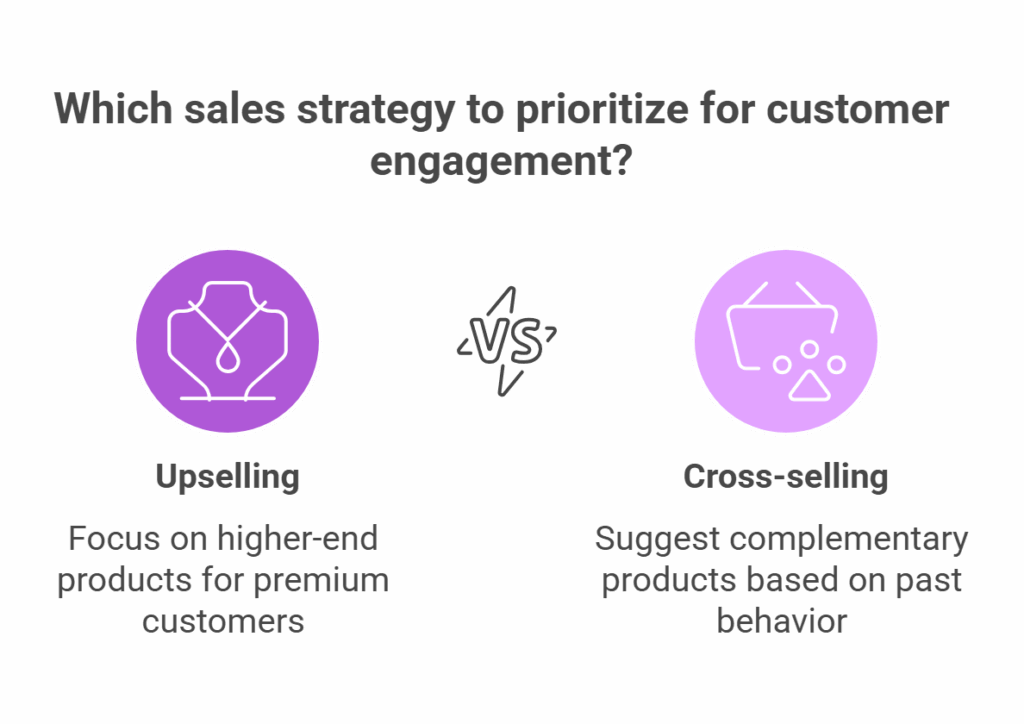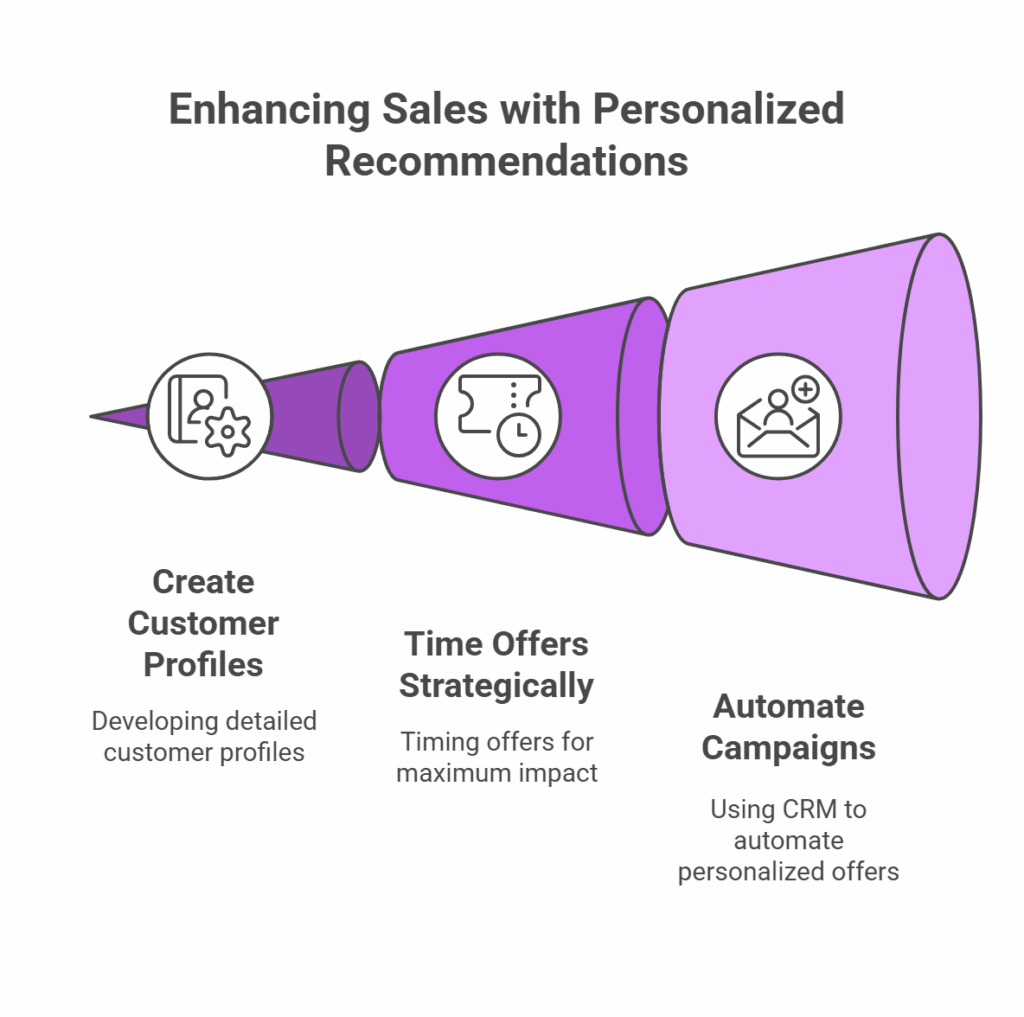Upselling and cross-selling are powerful strategies that businesses use to boost their revenue. When done right, these approaches not only increase sales but also improve customer satisfaction. Here's why they matter.
Upselling is about encouraging customers to go for a higher-end version of the product they're already considering, like upgrading to a premium model or adding more features. Cross-selling, on the other hand, involves suggesting complementary items that pair well with the customer’s original choice. Think of adding a phone case to a phone purchase, or a charger with a laptop.
Both upselling and cross-selling aim to increase value, not just for your business, but for the customer too. When done right, these strategies make customers feel understood and appreciated. That leads to better experiences, higher-order values, and stronger brand loyalty.
This is where CRM software steps in. It tracks customer behavior, purchase history, and preferences to generate data-backed recommendations. With these insights—and by leveraging CRM features every business should know, like segmentation, automated workflows, and behavior tracking—you can offer the right product at the right time, making your upselling and cross-selling more personalized and effective. In the next sections, we'll explore how tools like Fuzen can power this strategy for even greater results.
Understanding Upselling vs. Cross-Selling: Key Differences and Use Cases
To effectively apply upselling and cross-selling strategies, it's essential to understand their differences and the best times to use each. Let’s break it down clearly.
What is Upselling?
Upselling encourages customers to upgrade their purchase, like choosing a premium smartphone instead of a basic model.
- Works well with tech products
- Appeals to customers seeking better features and added value
What is Cross-Selling?
Cross-selling suggests complementary products to go along with the original purchase.
- Think: recommending shoes to match a dress
- Common in apparel and lifestyle brands, aiming to complete the shopper’s look
Key Differences
- Upselling improves the original item
- Cross-selling expands the overall basket
- Both aim to increase customer value, just through different approaches
Timing Matters
- Upselling is effective when customers are still deciding — a quality upgrade may sway them
- Cross-selling works best when customers are finalizing their purchase, and offering relevant add-ons enhances convenience
In the next section, we’ll explore how CRM tools can supercharge your upselling and cross-selling efforts using customer data, helping you deliver the right recommendation at exactly the right moment.
Leveraging CRM Software for Effective Upselling and Cross-Selling
CRM software is a powerful ally in strengthening your upselling and cross-selling strategies. It transforms basic sales tactics into data-driven approaches that feel both smart and personalized.
Data-Backed Recommendations
CRM tools collect and analyze customer data, including:
- Purchase history
- Browsing behavior
- Buying preferences
This helps uncover patterns that inform your sales approach.
- Upselling: If a customer previously chose premium options, you can recommend higher-end alternatives that match their habits.
- Cross-selling: CRM systems suggest complementary items — for example, recommending lenses or tripods to someone who buys a camera, based on other customers with similar buying behavior.
Smarter, More Relevant Offers
Because CRM suggestions are tailored, they feel useful rather than intrusive. They:
- Increase the likelihood of a purchase
- Improve the overall customer experience
- Make each recommendation feel intentional and valuable
Automation for Better Timing
CRM tools can also:
- Trigger personalized emails or push notifications
- Send timely offers based on customer activity
- Streamline communication with minimal manual effort
With CRM software, upselling and cross-selling become efficient, scalable, and more focused on customer satisfaction. Up next, we’ll show you how no-code platforms like Fuzen make this entire process even easier to implement.
Tips for Personalized Recommendations and Strategic Timing
Personalized recommendations can transform your upselling and cross-selling strategy. Instead of sending out generic offers, CRM tools let you tailor suggestions that actually matter to each customer.
Start with Smart Customer Insights
Use CRM software to analyze:
- Purchase history
- Browsing behavior
- Product preferences
This helps create a detailed customer profile. When you understand what your customer likes, it’s easier to recommend products they’ll actually want.
Time Your Offers Right
- Upselling is most effective post-purchase. After a customer has had a good experience, they’re more open to upgrading during their next visit.
- Cross-selling works best before checkout. Suggesting complementary items at this stage increases cart value and delivers a more complete shopping experience.
Automate for Consistency and Scale
CRM tools make it easy to:
- Send personalized offers at just the right moment
- Run automated campaigns triggered by customer behavior
- Keep messaging consistent without manual follow-ups
Automation saves time while ensuring every customer gets a relevant, timely recommendation.
Designing Tailored Upsell and Cross-Sell Workflows with NoCode Platforms like Fuzen
No-code platforms have revolutionized the way businesses approach upselling and cross-selling, making it simpler, smarter, and far more efficient. Fuzen, a leader in this space, empowers e-commerce businesses to build powerful, customized workflows right inside their CRM systems—without writing a single line of code.
With Fuzen’s intuitive builder, you can:
- Design specific upsell and cross-sell journeys that match your exact product catalog
- Use visual workflows to map out customer touchpoints and automate smart product recommendations
- Easily test, tweak, and scale your strategy as your business evolves
What truly sets Fuzen apart is the combination of no-code flexibility and AI-driven intelligence. Fuzen’s integrated AI tools help you analyze customer behavior and purchase history, so every upselling or cross-selling opportunity is personalized, data-backed, and timely. Whether it's recommending a higher-tier product or complementary add-ons, Fuzen ensures every suggestion adds real value for your customer.
Fuzen’s platform also offers:
- One-time hosting cost with no recurring subscription fees
- Advanced customization via built-in code editors (when needed)
- Seamless CRM integration to unify your sales and support efforts
In essence, Fuzen makes upselling and cross-selling not only more accessible but also far more strategic. By combining data, automation, custom cost development, and an easy-to-use interface, Fuzen helps businesses drive more revenue while keeping customers engaged and satisfied.
Conclusion
Incorporating CRM software into your upselling and cross-selling strategies offers numerous advantages. It lets you leverage customer data to make precise recommendations and automate personalized campaigns. This leads to better customer satisfaction and increased sales.
Fuzen's no-code solutions enhance these benefits by making it easy to design tailored workflows. With Fuzen, you can create scalable and efficient sales strategies that fit your unique product offerings. Its AI integrations further simplify the process, turning complex data into actionable insights.
By combining the power of CRM with Fuzen's innovative platform, businesses can transform their sales approach. Embrace no-code technology to craft strategies that drive more sales and deepen customer relationships. The future of smarter, data-driven sales tactics is here, and it's accessible to businesses of all sizes.

Pushkar is a seasoned SaaS entrepreneur. A graduate from IIT Bombay, Pushkar has been building and scaling SaaS / micro SaaS ventures since early 2010s. When he witnesses the struggle of non technical micro SaaS entrepreneurs first hand, he decided to build Fuzen as a nocode solution to help these micro SaaS builders.



